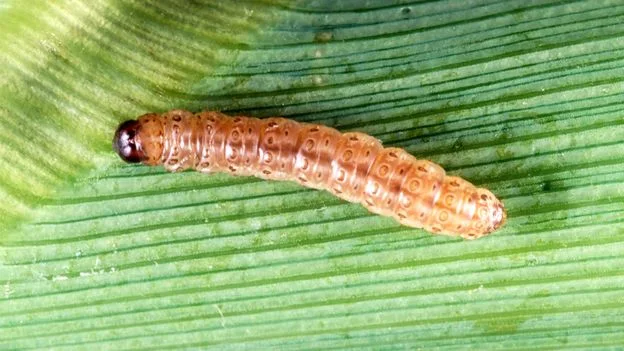Insects will be at the heart of worldwide crop losses as the climate warms up, predicts a US study.
 |
| Wheat, a crop typically grown in cool climates, could be hit hard, say the authors |
Scientists estimate the pests will be eating 10-25% more wheat, rice and maize across the globe for each one degree rise in climate temperature.
Warming drives insect energy use and prompts them to eat more. Their populations can also increase.
This is bound to put pressure on the world's leading cereal crops, says study co-author Curtis Deutsch.
"Insect pests currently consume the equivalent of one out of every 12 loaves of bread (before they ever get made). By the end of this century, if climate change continues unabated, insects will be eating more than two loaves of every 12 that could have been made," the University of Washington, US, researcher told BBC News.
What does the study show?
Prof Deutsch, Joshua Tewksbury and colleagues have conducted a study on a global scale and looked at three different grain crops that are staple foods for billions of people.The study, in the journal Science, uses data from across the globe to make a mathematical prediction that links the response of insects to temperature with the damage that is done to crops when the climate warms up.
Guy Poppy, who is Professor of Ecology at University of Southampton, UK, and works on food security said: "It is a novel piecing together of several pieces of a jigsaw".
The team put laboratory data from 38 insect species into the mathematical model. They looked to see how the energy use and growth responses of these insects to temperature might affect future crop losses.
There is already reckoned to be a direct effect of climate change on crops, with yields declining by about 5% for every one degree increase in temperature.
That loss will be 50% higher because of insect damage, said Prof Tewksbury from the University of Colorado Boulder, US.
So, this new research suggests the action of pests will accelerate temperature-induced impacts.
Which regions would be affected?
As the temperature rises insect populations grow and they eat faster. Prof Tewksbury added: "All of that adds up to bigger eating machines particularly in the temperate zone, like in the bread basket of Europe or in the corn belts of the US."In many European countries we're predicting 50-100 % increases in the impact of pests on crops."
This could mean total losses in European wheat yield of around 16 million tons due to pests.
But in the tropics, insects are already closer to the optimal working temperature and a rise in temperature is actually likely to start limiting populations.
This would lead to fewer insects and fewer crops being damaged.
How will things play out?
Some of the world's most productive regions of grain production are in the temperate zone and at risk, including US, France and China.This could be a real problem given that maize, rice and wheat account for 42% of the calories consumed by humans worldwide.
Already, 1 in 9 people suffer from chronic hunger across the globe.
Climate models suggest global surface temperatures could rise by 2-5 degrees by 2100.
Prof Deutsch thinks that "by the time we get to a 2-degree warming by mid-century we would be able to detect the kind of change in insect pest damage that we're anticipating".
 |
| Voracious: The European corn borer is expected to expand its range in warmer climes |
And there are several other factors that, if put into the team's mathematical model, could make the outcome even worse. These factors include plant pathogens carried by the insects, changed rainfall patterns and increasing atmospheric carbon dioxide concentrations.
What are the solutions?
"It's a general model. The increase in pest pressure we actually see on the ground will depend on how we grow our crops. We are going to adapt, but this is the model if we don't." Prof Tewksbury told the BBC.Pesticides use is common in Europe and especially the UK. But experts warn that pests may become more resistant to them in a warmer climate. "It may well mean that we need to shift to using more biological means of controlling pests," such as ladybirds, said Prof Poppy.
Other adaptive solutions might include shifting planting dates, rotating crops more and planting crops that are more resilient to pests.
But as Prof Poppy points out: "[In the UK recently] we've had snow, we've had peak rainfall and we've had a warm summer. When the growing season has to deal with all those things then that can be a particularly tough challenge."
Co-author Scott Merrill at University of Vermont told the BBC: "If we don't do some forward-thinking on this we are going to see real impacts on food insecurity. When we're dealing with pests it shouldn't be 'let's just try for a silver bullet', but more of an integrated strategy using a lot of different tactics".











0 Comments:
Post a Comment